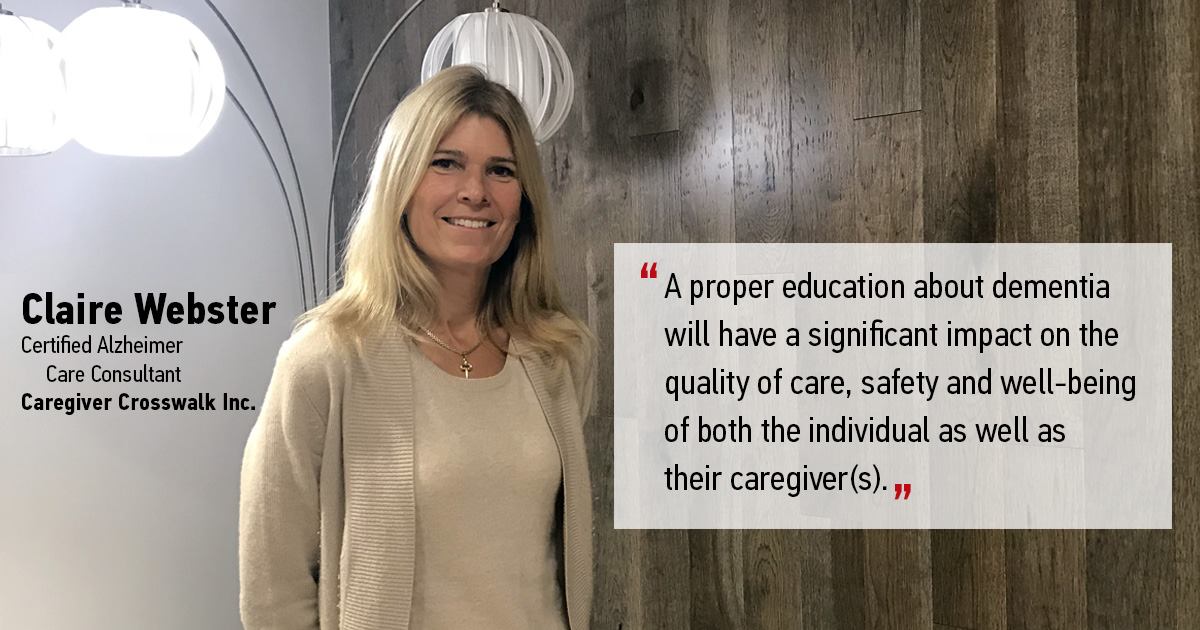Home Care Assistance is Changing the Way the World Ages. This is the latest installment of our “How To” series, where we lay out smart and easy-to-understand advice on navigating the aging process.
“I wasn’t prepared,” Webster remembers. “Everything I did was just winging it.”
With little dementia knowledge to go on, Webster struggled to balance her mother’s evolving needs with the ongoing demands of work, motherhood, and daily life for years before ultimately burning out. And then? She set out to completely redefine the kind of support available to caregivers like her.
Since 2015, Webster has become a Certified Alzheimer Care Consultant and Certified Professional Consultant on Aging. She founded Caregiver Crosswalk in 2016 to provide education and support for the family and friends who care for loved ones navigating Alzheimer’s or dementia. In 2017, she took that mission one step further, founding what is now a leading McGill University program geared to empower family and informal caregivers, as well as medical students, with a deeper understanding of the caregiver’s reality, and needs.
“I wanted to change the healthcare system,” Webster says. “I believe the way to do that is working collaboratively with universities to prepare medical students for the caregiver journey.”
That journey has been dramatically impacted by the COVID-19 pandemic. An Alzheimer’s Society report published in the United Kingdom has shown 46% of people with dementia say lockdown has negatively impacted their mental health. Include caregivers in that group, and 82% cite a worsening of symptoms for people with dementia since the pandemic began. All told, some 95% of caregivers say the pandemic has negatively affected their own mental or physical health, too.
Webster sees those numbers play out in real life daily. Family-members-turned-caregiver are usually untrained, lacking formal resources or support. For many, the added stress of locking down as programs closed, and healthcare resources became harder to access, has made a difficult caregiving situation unbearably hard.
Webster says navigating the complexities of dementia in the pandemic starts with information: “Education is power. That’s the only cure, because there is no magic pill right now. It’s about taking the time to understand the disease, understand the system, and anticipate what’s coming next.”
On the tactical front, that understanding and back-up plan should lay out a clear path for how someone’s care needs will change, and what would happen if the caregiver themselves could no longer meet a loved one’s needs. Webster suggests clients do their homework early, so they have a clear idea of what the next stage of the disease will look like, and inform themselves on options ahead of time. That’s something she always advises, and considers especially relevant as COVID-19 continues to spread. Still, pairing that continuous education and planning with strong emotional coping strategies is critical.
Change and isolation are already difficult for anyone with dementia to understand and process. In turn, as caregivers hit new levels of caregiving exhaustion, those feelings can seep into the way we communicate, which Webster says is all the more reason to not sweat the small stuff. If a choice someone’s making, or a story they’re telling, doesn’t hurt anyone? Let it go.
“The worst thing you can do for someone who has dementia is correct them,” says Webster. “If the person with dementia starts telling a story and the spouse is saying that’s not true… try joining their journey instead.”
Letting the little things go can be a good way to de-escalate heightened emotions in an already fraught period.
“If you’re having an off day and you’re impatient, [the person with dementia] will feel it – even if they can’t speak anymore,” Webster adds. “Avoid saying things like ‘Can’t you remember?’ or using a voice that’s too firm in tone. Take a step back, and disengage. Pick your battles at this point or everything could be considered an ordeal.”
Above all, Webster advises anyone balancing the stress of the pandemic with the responsibility of caregiving to include themselves on the proverbial caregiving to-do list. That means saying no to anything that doesn’t serve you well, being careful about toxic coping mechanisms, and giving yourself the same level of care you’d want for your loved one.
“Even though we’re all working from home, we can still commit to too many things, and be stretched too thin,” Webster says. “Take an inventory. Who are the people and commitments that are not adding value to my life right now? What can I let go of?”
Sound advice from someone who has been through the journey, and channels her experiences into better dementia care for all. Whether sharing insight for caregivers through her McGill Cares webcasts, or guiding clients struggling to access a dementia assessment in light of the pandemic, the importance of self-care is both something she lives by, and encourages others to embrace. “You have to protect your energy.”

